Get In Go Far
Kevin Carlton
As part of National Apprenticeship Week, Manufacturing Apprentice, Max Clarke, sat down with Leonardo’s VP Manufacturing & Supply Chain, Kevin Carlton, to find out what he’s achieved since beginning his career as an apprentice in the 1980s.
(MC) Why did you choose the apprentice route?
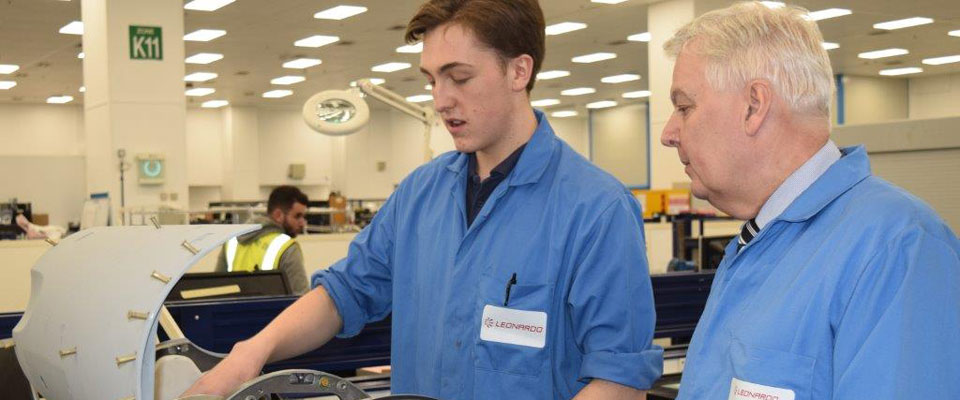 (KC) When I started my career, many young people followed their families into the business. My grandfather worked for Marconi, as did my father, so it seemed like the natural thing to do. I wasn’t planning on going to university; I wanted to get into engineering, as I’m quite mechanically minded and enjoy things like DIY. I wanted to get into an apprenticeship and was fortunate to be offered a role at Marconi, so I went straight in, lived at home and my dad drove me to work!
(KC) When I started my career, many young people followed their families into the business. My grandfather worked for Marconi, as did my father, so it seemed like the natural thing to do. I wasn’t planning on going to university; I wanted to get into engineering, as I’m quite mechanically minded and enjoy things like DIY. I wanted to get into an apprenticeship and was fortunate to be offered a role at Marconi, so I went straight in, lived at home and my dad drove me to work!
(MC) Mine does that too.
(KC) There’s more competition now. In the Chelmsford area during the 1980s, Marconi was only company offering apprenticeships, and I desperately wanted to get in there. I joined as a mechanical technician and went off to college and night school 4-9pm in Chelmsford. When I finished my apprenticeship, the company offered me the opportunity to do an HNC. I wasn’t going to, but the guy I was working for sat me down and gave me a good talking to, explaining that when you stop your education, you will never go back and do it again. So he told me not to stop until I really felt I had to stop. Just keep learning all the way through.
(MC) That’s good advice.
(KC) Apprenticeships provide a good grounding in communicating with people. You turn up on day one and you don’t know anybody. It’s like the first day of school isn’t it? But you soon get talking to your own peer group and then on the apprenticeship you are talking to people in the business; people who have worked on the shop floor for years. It helps you with your life skills being able to communicate. I would always advocate an apprenticeship to be honest. I’m a big big believer in them.
(MC) How did you feel working on the apprenticeship scheme?
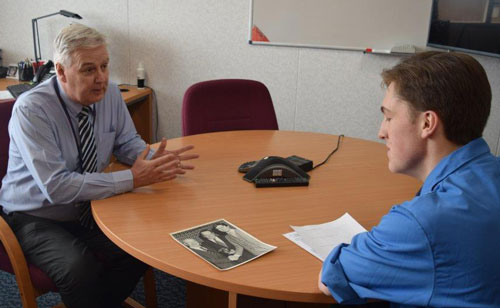 (KC) I enjoyed it. When you get into business, you’ll find a wide range of characters. So it’s a great life lesson and moving people around, you get to know different characters and how they react.
(KC) I enjoyed it. When you get into business, you’ll find a wide range of characters. So it’s a great life lesson and moving people around, you get to know different characters and how they react.
One of the skillsets I learned, and which has served me really well going throughout my career, is that I feel as comfortable talking to people on the shop floor as talking to senior executives. It comes from confidence, which only comes from moving through the organisation and talking to people at different levels. Apprenticeships teach you communication skills.
The photo (right) I showed you earlier was from an event where I had to stand up in front of 300 people and give a small speech of thanks and presentation to Lord Scanlon. I was incredibly nervous and worried about it for a week beforehand. There were many senior executives from the then GEC organisation, and Lord Scanlon was a big political figure. It was the first time that I’d ever had to stand up in front of an audience. Nowadays, I always tell myself that when you stand up in front of people you know, generally you know more about what you’re talking about than anyone else in the audience. There are not many people who can challenge you, and if they do, then you have usually an answer for it.
(MC) How do you think the apprenticeship scheme has evolved and changed / improved over the years?
(KC) Some of the core principles are still there. You still move around and do different things and it’s still over 3-4 years. Technology has moved on, which has forced the apprenticeship to change quite a bit. I spent a year in a machine-shop type of environment where we had to learn to use lathes, mills, drills, weld and braze. I’m sure people today would like to learn how to weld and braze things. We used to make many of the components that we still use today. We had to use those machines. Today we buy those parts in.
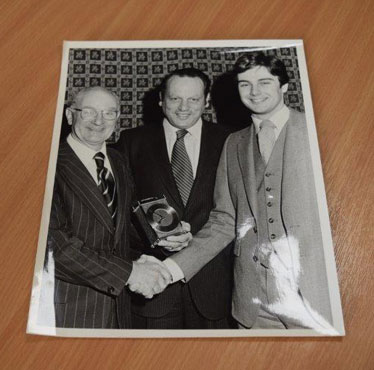 I suspect the level of intelligence of the people we are bringing in nowadays is higher than in my day. You guys are all a lot brighter. I’ve got a son and daughter and now a granddaughter, and its second nature to them to use mobile phones. Apprenticeships need to continue to evolve to keep up with technology. Eventually we will get to a stage where there will be a smartphone app and the PAU’s you use will be on an app or some sort of small device. At the moment, we have big screens on the shop floor, but there will be tablets. You’ll see the supervisor; he’ll load on the project you will work on, you’ll walk away with the tablet, the kit will arrive automatically and the tablet will have all the instructions and drawings on it. I can see that coming in the next 5-10 years, as everything is moving at a huge pace.
I suspect the level of intelligence of the people we are bringing in nowadays is higher than in my day. You guys are all a lot brighter. I’ve got a son and daughter and now a granddaughter, and its second nature to them to use mobile phones. Apprenticeships need to continue to evolve to keep up with technology. Eventually we will get to a stage where there will be a smartphone app and the PAU’s you use will be on an app or some sort of small device. At the moment, we have big screens on the shop floor, but there will be tablets. You’ll see the supervisor; he’ll load on the project you will work on, you’ll walk away with the tablet, the kit will arrive automatically and the tablet will have all the instructions and drawings on it. I can see that coming in the next 5-10 years, as everything is moving at a huge pace.
(MC) Why have you stayed in the business for so long?
(KC) In terms of the company itself, i.e. Leonardo and its origins, I’ve done 10 years back here now. In total, I’ve done 26 years, with a break in the middle, so I’ve done quite a bit of time with this company and I enjoy it. Interestingly, a lot of the people I originally worked alongside at Marconi in the 1980s, now work for me. I guess there is a sort of family orientation around here and when I look around this business, there are different members of families – sons and daughter who are following mums and dads – which is a really strong message as well.
Having worked in different companies, I hear people say “it’s better to work down the road” or “it’s better (elsewhere) to do this”. But I’ve worked for many companies where people here would struggle working for them, in very dirty environments. Even in our machine shop, it’s a clean environment compared to some of the machine shops I’ve worked in. This is a good employer.
Dean Vincent
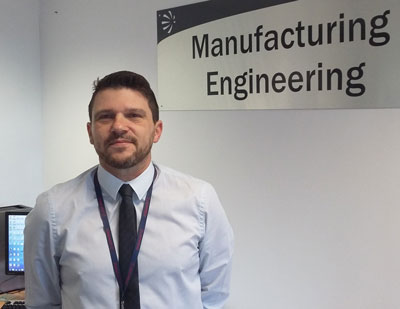 Why did you choose an apprenticeship as a career path?
Why did you choose an apprenticeship as a career path?
Soon after starting at Yeovil College, I was offered the chance to join a Youth Training Scheme (YTS). I felt that this was would be a better career path for me, as it gave me a chance to earn a small wage with the added benefit of providing a more practical insight into machining / grinding / fabrication / welding, whilst also continuing my studies.
What did your apprenticeship involve?
During my first year, I was full-time on the YTS at Yeovil College. At the of this first year, I had an interview to join Leonardo as an apprentice. Years 2-4 were spent on site gaining an understanding of best practices of mechanical fitting skills, while spending one day per week continuing my studies at college. Those three years gave me experience of the build lines and GASSY (formerly DMC), our detail manufacture and sub assembly centre area, whilst also spending time in other technical areas to fully understand the work that goes into providing the operators with the required information. This enabled me to better understand what goes on behind the scenes of the production line in order for it to run smoothly. It was a great opportunity to work within the Quality department for a three-month period.
What did you enjoy most about the apprenticeship
The craft apprentice was very good as it allowed me to have a good understanding of aircraft structure / mechanical systems and testing, providing me with a good foundation of skills that I still use every day. Also, the camaraderie within the production line made my apprenticeship an enjoyable experience and I still have friends to this day who I met on the scheme. Finally, I benefited from the time and patience given to me by the operators who looked after me as an apprentice; their support was very much appreciated.
What is your role in the company now?
Today I am Head of Manufacturing Engineering (Final Assembly Line) where one of our main tasks is to provide work instructions to the production operators, liaising with other departments such as Engineering, Procurement, MRP and Material Supply, working within Operations. This means I’m responsible for the overall running, manpower and resourcing, quality, cost and scheduling of the department which includes the Final Assembly Line, Electrical Manufacturing Centre, Component Manufacturing Centre and Central Tooling. The role is very challenging but enjoyable, especially today with the amount of aircraft to be delivered and having to deal with various production and technical functions.
Wayne Clifton
When did you join as an apprentice?
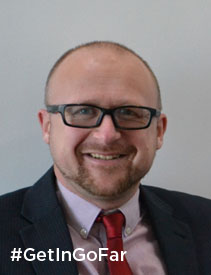 I joined GEC Marconi in 1995 as an Electrical Apprentice. Since then I have worked at both the Luton and Basildon sites, and have held roles in various functions throughout the business, including Quality, Operations, Procurement, Engineering, Internal Audit and Project / Programme Management.
I joined GEC Marconi in 1995 as an Electrical Apprentice. Since then I have worked at both the Luton and Basildon sites, and have held roles in various functions throughout the business, including Quality, Operations, Procurement, Engineering, Internal Audit and Project / Programme Management.
Why did you choose an apprenticeship as a career path?
When I left school I was unsure of which career path to take. I wanted to work and earn money, and also wanted to continue my education and better myself for the future. I was a practical child, often tinkering with cars and the like, with my father. My dad had been a Mechanical Apprentice so I looked into Apprenticeships. I enjoyed electronics at school and started to look into Electrical Apprenticeships as a preference.
What attracted you to our business?
GEC Marconi was local to me, and upon investigation, the idea of going into the Defence industry appealed. A diverse product portfolio and an ability to be involved in everything from research through to development, production and support meant that I could develop, trying many different roles whilst deciding what I wanted to do with my career.
What has encouraged you to stay with us?
I had just turned 16 years old when I started work and I found the apprenticeship quiet difficult to start with. I matured quickly and gained confidence in an environment very different to school and college. I moved through the company every six months and experienced many different roles, which allowed me to understand the mechanics of the business in parallel with my college work. Following my apprenticeship, I continued my education at night school in London and started to build a career. Over the past 20 years or so, I’ve had the opportunity to travel the world, experience different cultures and ways of working, and been involved in things that I would otherwise have never experienced. I’ve been offered a number of other roles outside of Leonardo but I have been allowed to move around within the company whilst moving up the career ladder.
What is your position in the company now and what role did your apprenticeship play in your progression?
I’m Vice President of the Surveillance and Protection Technologies Business area. I have responsibility for product development and delivery, and I’m heavily involved in business winning activities. I think my apprenticeship helped provide me with the rounded background I need to deliver the business area I am responsible for, and understand the mechanics of the business and how each department and role contributes to the success of the business as a whole. In my early career I felt this was an advantage to people that were coming from a graduate scheme, and as I’ve progressed I’ve continued to build on this knowledge and take on new challenges. It’s fair to say I’m a big fan of modern apprenticeships.
Niall Ingram
 When did you join as apprentice?
When did you join as apprentice?
September 1978.
Why did you choose an apprenticeship as a career path?
I visited a careers convention held at my school (Watford Boys Grammar School) at which Marconi Space & Defence Systems (MSDS) were advertising their apprenticeship scheme. It became apparent to me that instead of staying at school and doing A-levels, it was possible to further my education, specialising in electronic engineering, get industrial experience and earn some money whilst still having the option to go on to university.
What attracted you to our business?
I was attracted by the glamour of the defence industry. At the time, the industry led the way in terms of state-of-the-art technology. Whilst consumer electronics now leads many aspects of this today, we do still find ourselves testing the laws of physics.
What has encouraged you to stay with us?
The job has always been interesting and diverse. I’ve done many different jobs on many different projects and had the opportunity to travel the world. Throughout my career, I’ve always been presented with new and exciting challenges which have kept me interested and engaged. But there is nothing more satisfying than supporting equipment trials where you can see how the design work we do on a computer and testing we do in the laboratory results in products which protect our customers.
What is your role in the company now and what role did your apprenticeship play in your progression?
I’m now Vice President CTO/Capability. I’m responsible for leading development of the Electronic Warfare (EW) strategy and ensuring that the EW products and technologies we develop are matched to the operational needs of our customers and thus will provide a good return on investment. The apprenticeship scheme provided me with a strong, grassroots foundation where I learnt the breadth of what the business does and how it does it. I’ve built upon this foundation throughout my career, and indeed without it, I wouldn’t be where I am today.
Chris Slade
Studying and learning on the job
I joined the company in 2007 as an Electrical Craft Apprentice. The first year of my apprenticeship involved a year at college, completing an NVQ Level 2 course in Engineering. This was a great experience as I met lots of new people who I’m still friends with today.
For my second, third and fourth year, I was onsite, where I had placements in the Electrical Manufacturing Centre, avionics, build line, and flight shed. I really enjoyed all these opportunities as they enabled me to understand different elements of the business and how they integrated with each other. During these placements I completed my NVQ level 3 in aeronautical engineering. At times completing the NVQ was challenging. However, colleagues and other apprentices were always willing to help me succeed.
During this time I was fortunate to participate in the G-Lynx speed record restoration project; it was great to be a part of this and see the aircraft returned to its former glory.
Taking up a permanent role
Upon completion of my apprenticeship, I joined the Lynx production team. This was great, as it had been a team I had worked with previously. With a strong team ethic in place, I was instantly made to feel part of the team, later becoming a team Co-ordinator within Lynx production.
In July 2016, I started a new role within the business as a Customer Support Engineer for Training & Helicopter Support Systems. This includes providing customers with training on how to use bespoke training devices that we manufacture and design for them. I’m also responsible for ensuring the devices remain operational at all times. This new job opportunity has enabled me to travel and visit our customers on site, understanding their needs and challenges to benefit the business moving forward.
Fantastic opportunities
On the whole I’ve not had any negative experiences within the business. I would highly recommend the apprentice scheme to anyone who is interested in engineering, there are some fantastic opportunities to be had.
Callum Langford
Studying and learning on the job
In 2007 I applied for an apprenticeship to become an electrical aerospace engineer and after a successful interview and selection process I was accepted into the Leonardo Helicopters family.
The apprenticeship was four years long with the first and part of the second year spent at Yeovil College learning all the basic skills I would need to work on aircraft. The remaining years were spent at Leonardo Helicopters’ Yeovil site. In my spare time I decided to join the Company’s apprentice association social committee who organise different events from surfing trips to cider festivals with the goal of keeping a good balance between work and play.
Taking up a permanent role
As well as gaining my BTEC National Certificate and NVQ in aeronautical engineering, through these four years I also worked on various different helicopters and experiencing working life in the different departments on the site. This approach is all geared towards expanding your knowledge about the helicopters and helping you decide where you feel you would be best suited to work at the completion of your apprenticeship.
After I finished my 4 year apprenticeship, I was given a position on the AW101 production line installing looms and avionics equipment on the aircraft. I soon made my way up to an aircraft inspector and two years later I decided to challenge myself further by joining the Field Service department. Since I joined this department I have traveled to locations all over the UK and worked in several countries including Italy, Denmark, Nigeria and Canada to support airshows, aircraft modifications, servicing and trials.
Fantastic opportunities
I would say that if you enjoying putting yourself in challenging situations, enjoy being practical, working with your hands and problem solving then this is the apprenticeship for you. Leonardo gives you the opportunity to progress professionally and personally. I feel I definitely made the right decision in applying and haven’t looked back since.

